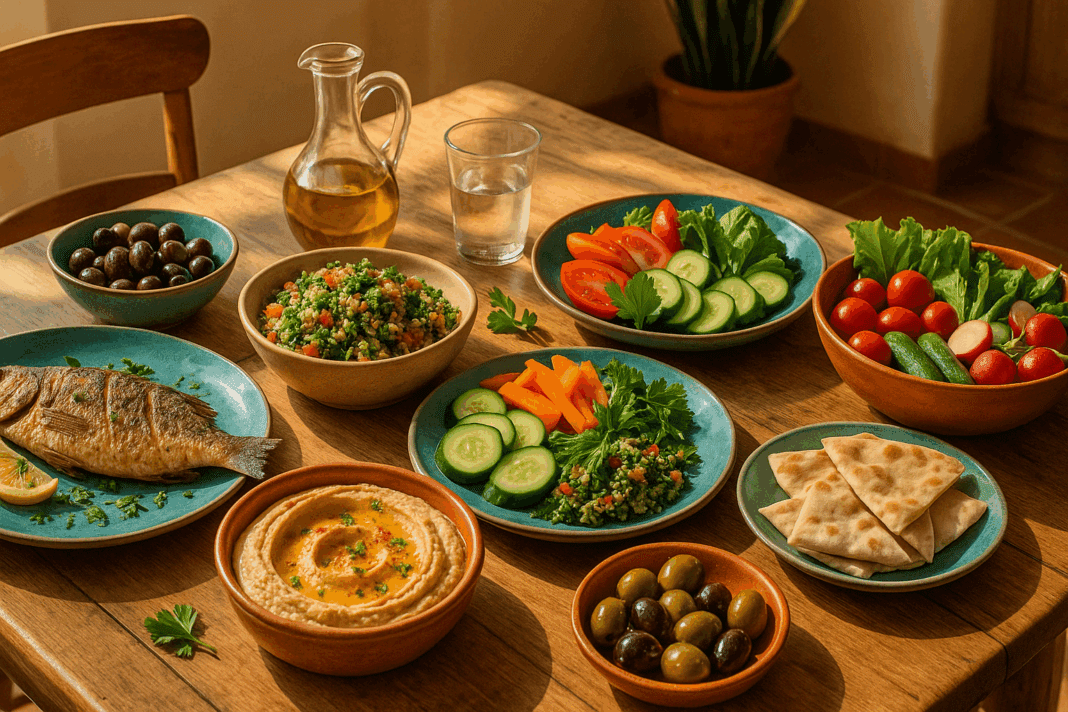The Mediterranean diet has earned its reputation not just from tradition and taste, but from a wealth of scientific evidence supporting its impact on health and longevity. Grounded in the culinary customs of countries bordering the Mediterranean Sea, this dietary approach emphasizes whole, plant-based foods, healthy fats, and mindful eating. It is consistently ranked among the best diets for heart health, weight management, and overall well-being. For those seeking practical, sustainable strategies to improve their diet, understanding the foundational principles of healthy Mediterranean meals can offer both immediate satisfaction and long-term benefits.
You may also like: Plant Based Diet vs Standard American Diet: What the Latest Studies Reveal About Long-Term Health Outcomes
A significant part of the diet’s appeal lies in its flexibility and delicious diversity. Unlike restrictive eating patterns such as the ketogenic diet vs low carb plans, which can be rigid and harder to maintain, the Mediterranean style is more about balance than elimination. While many wonder, “Is keto a good diet?” or “Is a keto diet sustainable in the long term?”, research continues to show that the Mediterranean diet offers comparable, if not superior, results for long-term health without the metabolic or social downsides often associated with the low carb diet keto diet models. Moreover, unlike keto where carbs are heavily restricted, the Mediterranean approach embraces complex carbohydrates in the form of whole grains, legumes, and vegetables, making it a more inclusive and socially adaptable way of eating.
To help make the Mediterranean lifestyle more approachable, this article will explore medically-backed insights into how to structure healthy Mediterranean meal ideas for weight loss and overall vitality. We’ll also break down how it compares to other popular approaches like the ketogenic and low carb diets, provide practical Mediterranean diet menu ideas, and conclude with a complete 7-day Mediterranean diet meal plan—including a Mediterranean diet meal plan shopping list—to make implementation easy and effective.
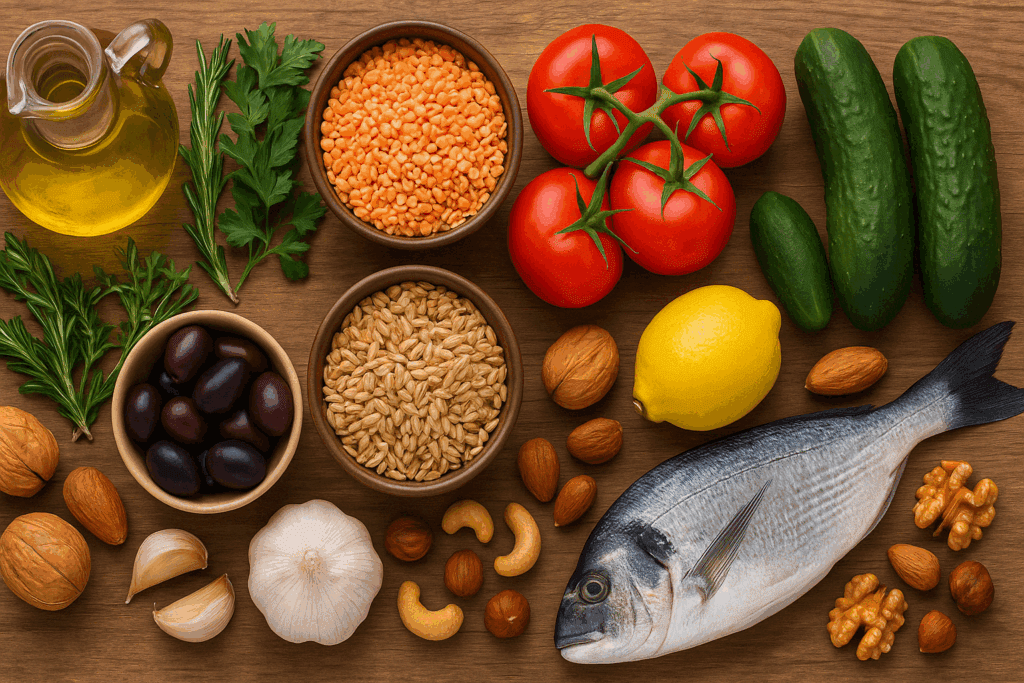
Understanding the Foundation of a Healthy Mediterranean Meal
A healthy Mediterranean meal centers around fresh, whole foods, minimally processed ingredients, and seasonal produce. Olive oil is the primary fat source, replacing butter or margarine. Meals typically include a colorful array of vegetables, whole grains like farro and bulgur, beans and lentils, nuts and seeds, and modest portions of seafood, eggs, and dairy. Red meat and processed foods are consumed sparingly, if at all. Herbs and spices—not salt—enhance flavor.
The Mediterranean approach aligns with evidence-based principles of nutrition that promote reduced inflammation, lower cardiovascular risk, and improved metabolic function. While low carb Mediterranean diet meal plans are gaining popularity among those looking to balance blood sugar or accelerate fat loss, the traditional Mediterranean model already includes natural mechanisms for blood sugar regulation through fiber-rich legumes, slow-digesting grains, and the moderate intake of unsaturated fats.
Examples of Mediterranean food abound in global culinary culture—think hummus with whole grain pita, lentil and vegetable soup, or a simple tomato, cucumber, and olive salad with a drizzle of extra virgin olive oil. These meals are not only flavorful but also deeply nourishing. Scientific studies have shown that individuals following a Mediterranean diet to lose weight often experience lower waist circumference, better cholesterol profiles, and reduced markers of inflammation compared to those on is keto a low carb diet plans or other low-carb regimens.
Mediterranean Diet Ideas for Breakfast, Lunch, and Dinner
When planning Mediterranean diet meals, variety and balance are key. For breakfast, options might include plain Greek yogurt with fresh berries and walnuts, or whole grain toast with avocado and sliced tomatoes. Unlike high-fat keto breakfasts that may feature bacon and butter-heavy dishes, Mediterranean mornings are lighter and fiber-rich, offering longer-lasting satiety.
Mediterranean diet lunches are typically built around vegetables, legumes, and whole grains. A chickpea salad with arugula and lemon-olive oil dressing, or a quinoa bowl with roasted vegetables and hummus, makes for a nutrient-dense mid-day meal. These meals compare favorably with low carb diet keto diet alternatives, which often rely on high-fat animal proteins and limited fiber, potentially impacting long-term gut health and cardiovascular function.
Dinner is an opportunity to highlight some of the healthiest Mediterranean dishes. Grilled fish with a side of steamed greens and lentils, or a hearty vegetable stew with beans and barley, are both satisfying and nutritionally balanced. These Mediterranean diet dinners are satisfying without relying on the calorie-dense fats and low-fiber composition of ketogenic-style med diet dinners. Moreover, they are naturally lower in sodium, aligning well with low sodium Mediterranean diet recipes that support blood pressure control.
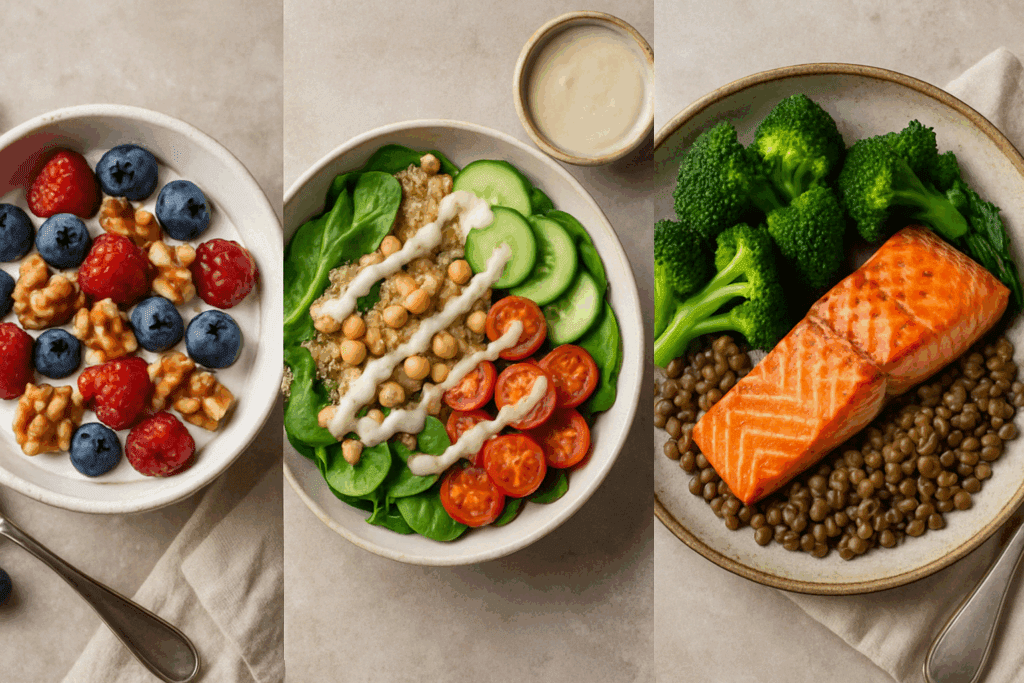
Comparing the Mediterranean Diet to Keto and Low Carb Diets
There is ongoing public interest in how the Mediterranean diet stacks up against the keto diet vs low carb diet debates. Many people assume that is keto a good diet due to its rapid weight loss results. However, scientific evidence reveals that although ketogenic diets can lead to short-term fat loss, they are often difficult to sustain and may come with nutrient deficiencies if not carefully managed.
In contrast, the Mediterranean diet prioritizes dietary patterns that are rich in phytonutrients, fiber, and heart-healthy fats. Unlike the low carb diet keto diet plans, which can strain kidney function or limit athletic performance over time, Mediterranean diet meal ideas are designed to nourish rather than restrict. Is keto no carbs? While it’s true that keto significantly limits carbohydrates, the Mediterranean model embraces healthy carbs, emphasizing food quality over quantity.
Research from leading institutions including Harvard, the Mayo Clinic, and the World Health Organization supports the Mediterranean diet as a sustainable and effective model for weight loss, especially when combined with physical activity and mindful eating habits. This makes it an excellent choice for those seeking a more balanced approach to dietary change.
Crafting Your Own Mediterranean Diet Menu Ideas
When creating personalized Mediterranean diet menu ideas, it helps to think in terms of food categories and diversity. A well-planned Mediterranean plate often includes one whole grain, one legume or protein, at least two vegetables, and a drizzle of olive oil or handful of nuts. The addition of herbs like oregano, basil, and parsley elevates flavor without needing added salt.
Those seeking a low carb Mediterranean diet meal plan can still follow this structure by emphasizing non-starchy vegetables, using legumes in moderation, and substituting high-carb grains with alternatives like cauliflower rice or zucchini noodles. Even within this modified structure, the meals remain far more balanced and fiber-rich than strict keto meals, allowing individuals to avoid the common pitfalls of is a keto diet sustainable over time.
Mediterranean diet lunches can feature grilled vegetable wraps with hummus, while dinner might include stuffed bell peppers with quinoa and lentils. Each meal reinforces the evidence that healthy Mediterranean eating doesn’t sacrifice flavor or satisfaction. By focusing on variety and freshness, your meals remain exciting, nutritious, and aligned with science-backed recommendations.
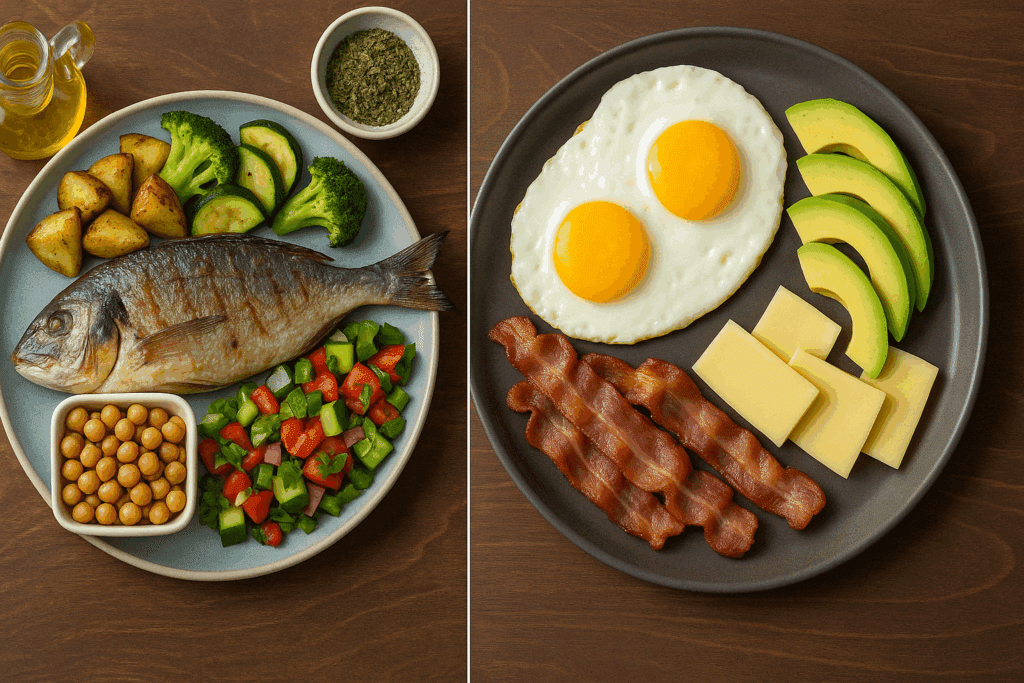
Building a Realistic 7 Day Mediterranean Meal Plan for Weight Loss
To bring all of this into practice, we’ve created a 7 day Mediterranean meal plan designed to support weight loss, boost energy, and simplify your grocery planning. This meal plan emphasizes practical recipes for Mediterranean diet adherence while avoiding unnecessary complexity.
Day 1:
- Breakfast: Greek yogurt with sliced strawberries, chia seeds, and a drizzle of honey
- Lunch: Mediterranean lentil soup with a side of mixed greens dressed in olive oil and lemon
- Dinner: Grilled salmon with farro and steamed broccoli
Day 2:
- Breakfast: Oatmeal with walnuts, dates, and cinnamon
- Lunch: Chickpea and cucumber salad with cherry tomatoes and feta
- Dinner: Stuffed bell peppers with quinoa and sautéed spinach
Day 3:
- Breakfast: Whole grain toast with avocado and tomato
- Lunch: Hummus wrap with arugula, shredded carrots, and roasted red pepper
- Dinner: Lentil and eggplant stew with whole grain couscous
Day 4:
- Breakfast: Smoothie with almond milk, banana, spinach, and flaxseeds
- Lunch: Quinoa salad with olives, cucumber, and fresh herbs
- Dinner: Baked cod with ratatouille and a side of wild rice
Day 5:
- Breakfast: Greek yogurt parfait with granola and fresh figs
- Lunch: Farro bowl with roasted chickpeas, kale, and tahini dressing
- Dinner: Mushroom and white bean risotto with a side of roasted asparagus
Day 6:
- Breakfast: Chia pudding with almond milk, mango, and pistachios
- Lunch: Tomato and lentil soup with a slice of whole grain bread
- Dinner: Grilled shrimp with couscous and arugula salad
Day 7:
- Breakfast: Scrambled eggs with sautéed spinach and a slice of whole grain toast
- Lunch: Falafel with tahini sauce, cucumber salad, and tabbouleh
- Dinner: Zucchini and chickpea stew with brown rice
Shopping List for a Mediterranean Diet Meal Plan
To prepare for this 7 day Mediterranean diet for weight loss, here’s a basic Mediterranean diet meal plan shopping list to guide your grocery trip. Focus on seasonal and organic items where possible for the best flavor and nutritional value.
Produce: Tomatoes, cucumbers, spinach, kale, arugula, bell peppers, zucchini, eggplant, broccoli, asparagus, carrots, onions, garlic, lemons, figs, mangoes, strawberries, bananas
Whole Grains: Farro, quinoa, wild rice, brown rice, oats, whole grain bread and wraps, couscous
Proteins and Legumes: Chickpeas, lentils, white beans, black beans, Greek yogurt, eggs, salmon, shrimp, cod
Healthy Fats: Extra virgin olive oil, walnuts, almonds, chia seeds, flaxseeds, pistachios, tahini
Dairy (optional): Feta cheese, plain Greek yogurt
Herbs and Spices: Oregano, basil, parsley, cumin, turmeric, black pepper, cinnamon
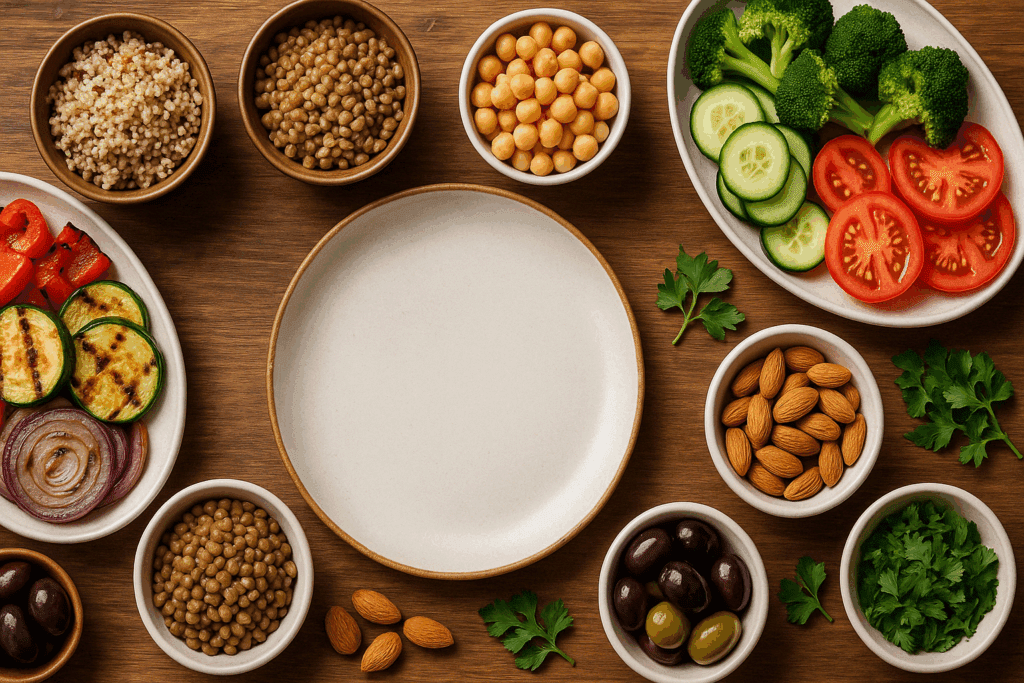
Frequently Asked Questions About Mediterranean Diet Meal Planning and Weight Loss
1. How can I personalize Mediterranean diet meals if I have specific food intolerances or allergies?
Personalizing Mediterranean diet meals is entirely feasible, even for individuals with food intolerances or allergies. For instance, if you’re allergic to nuts—a common component in many Mediterranean diet menu ideas—you can replace them with seeds like sunflower or pumpkin seeds for a similar crunch and healthy fat profile. Those with dairy sensitivities can opt for plant-based yogurts or cheeses when creating Mediterranean diet lunches or snacks, especially when trying recipes for Mediterranean diet variations that require creaminess or tang. Gluten-free eaters can rely on naturally gluten-free whole grains such as quinoa, buckwheat, or millet, which fit beautifully into a 7 day Mediterranean meal plan. The core philosophy of this eating style—emphasizing fresh produce, whole foods, and minimally processed ingredients—makes it remarkably adaptable to individual dietary needs without compromising its nutritional value.
2. What role does intermittent fasting play in a Mediterranean diet to lose weight effectively?
While not mandatory, intermittent fasting can enhance the effectiveness of a Mediterranean diet to lose weight, especially when paired with a structured 7 day meal plan Mediterranean diet framework. For example, time-restricted eating (like 16:8 fasting) works well with Mediterranean diet dinners that emphasize lighter, plant-forward meals, making digestion easier before the fasting window begins. By timing your meals around natural hunger cues and choosing nutrient-dense Mediterranean diet meal ideas—like grilled vegetables, legumes, and olive oil-rich dishes—you can support metabolic health while reducing calorie intake without feeling deprived. This approach may also help regulate insulin levels, which is particularly useful for those transitioning from low carb Mediterranean diet meal plan strategies. Intermittent fasting is best introduced gradually and should be guided by individual health status and lifestyle.
3. Are there ways to make Mediterranean diet lunches more portable for work or school?
Absolutely—Mediterranean diet lunches can be easily packed and made travel-friendly with a little preparation. Mason jar salads layered with chickpeas, quinoa, greens, and vinaigrette are ideal for grab-and-go meals. Wraps made with whole grain flatbreads, filled with hummus, roasted veggies, and olives, are both satisfying and easy to transport. You can also prepare Mediterranean diet meal ideas like lentil stews or farro bowls in reusable containers for reheating. When planning recipes for Mediterranean diet lunches, keep in mind the importance of including a source of fiber, protein, and healthy fats to keep you full and energized through the afternoon. The more variety you introduce into your meal prep, the more sustainable your healthy Mediterranean eating habits will be.
4. How does the Mediterranean diet compare nutritionally to a ketogenic or low-carb diet?
Nutritionally, the Mediterranean diet is significantly more balanced than ketogenic or low-carb diets, offering a broader range of micronutrients, fiber, and antioxidants. While a low carb Mediterranean diet meal plan can incorporate some elements of carb reduction, the Mediterranean model does not entirely eliminate carbohydrates, instead focusing on their quality—whole grains, legumes, and root vegetables are all welcomed. Ketogenic diets often lack in dietary fiber and can result in micronutrient gaps if not carefully supplemented. In contrast, a healthy Mediterranean meal includes polyphenol-rich produce and omega-3-rich fish, which together support cardiovascular and cognitive health. For long-term wellness and sustainability, the Mediterranean diet’s diversity and flexibility give it a clear nutritional advantage.
5. What are some underrated ingredients in Mediterranean diet menu ideas that people often overlook?
Many people associate Mediterranean diet menu ideas with common staples like olive oil, tomatoes, and fish—but several lesser-known ingredients offer unique nutritional benefits. Capers, for instance, are often used in Mediterranean diet dinners and provide a punch of flavor along with antioxidant compounds like quercetin. Purslane, a wild green found in some Mediterranean regions, is rich in alpha-linolenic acid, a plant-based omega-3. Fermented dairy like kefir can add beneficial probiotics to Mediterranean diet meals, especially when included in breakfasts or smoothies. Other underused but impactful components include roasted fennel, pickled turnips, and fresh herbs like mint and dill. These ingredients not only elevate the flavor profile of recipes for Mediterranean diet but also expand the nutrient diversity on your plate.
6. Can I follow a Mediterranean diet on a budget, and what are some cost-saving tips?
Following a Mediterranean diet on a budget is not only possible—it’s often more affordable than diets reliant on specialty products or high quantities of animal protein. Legumes, whole grains, and seasonal vegetables form the core of many Mediterranean diet meal ideas and are among the least expensive staples in any grocery store. Opting for canned or dried beans and frozen vegetables can further reduce costs without compromising nutritional quality. Creating a rotating 7 day Mediterranean diet for weight loss plan helps minimize food waste and makes use of bulk ingredients efficiently. When planning your Mediterranean diet meal plan shopping list, stick to versatile ingredients—like olive oil, lentils, onions, and canned tomatoes—that can be used across multiple meals throughout the week.
7. What are some strategies to reduce sodium in Mediterranean diet dinners without sacrificing flavor?
Reducing sodium while maintaining flavor in Mediterranean diet dinners is simple with the right culinary techniques. Instead of salt, amplify taste with acidic elements like lemon juice or vinegar, which brighten the natural flavors of vegetables and grains. Toasted spices, such as cumin or coriander, can add warmth and depth to Mediterranean diet meals without raising sodium levels. Using fresh herbs like basil, parsley, or cilantro right before serving enhances both aroma and taste. For those following low sodium Mediterranean diet recipes, marinating vegetables or proteins in garlic and citrus can infuse dishes with boldness, minimizing the need for salt. The goal is to build complexity through layering—not just relying on sodium to enhance flavor.
8. How can I adapt a 21 day Mediterranean diet menu for seasonal eating throughout the year?
Adapting a 21 day Mediterranean diet menu for seasonal eating allows you to enjoy fresher flavors and optimize nutrition. In the spring, Mediterranean diet ideas can include peas, artichokes, and asparagus paired with bulgur or quinoa. Summer offers ripe tomatoes, cucumbers, and zucchini, perfect for chilled Mediterranean diet lunches like gazpacho or tabbouleh. Fall and winter are ideal for hearty soups and Mediterranean diet dinners made with lentils, root vegetables, and dark leafy greens. Seasonal eating not only improves taste and nutrient density but also supports more sustainable and local food systems. Incorporating seasonally abundant ingredients into your 7 day meal plan Mediterranean diet schedule ensures meals stay exciting and aligned with nature’s rhythms.
9. What psychological or behavioral factors help support long-term success on a Mediterranean diet to lose weight?
Long-term success on a Mediterranean diet to lose weight often hinges more on mindset than mechanics. Unlike restrictive eating plans, the Mediterranean approach encourages mindful eating and positive reinforcement, which promotes a healthier relationship with food. Creating rituals around meals—such as enjoying Mediterranean diet dinners with family or slowing down during lunch breaks—helps reinforce healthy habits. Studies also show that meal variety, which is abundant in Mediterranean diet menu ideas, prevents boredom and reduces the likelihood of diet fatigue. Behavioral strategies like journaling food experiences or setting weekly Mediterranean diet meal plan goals can also improve adherence by fostering intention and accountability.
10. How can I create a Mediterranean diet meal plan shopping list that minimizes food waste and maximizes nutrition?
To create an effective Mediterranean diet meal plan shopping list, start by outlining your week using a 7 day Mediterranean diet for weight loss or 21 day Mediterranean diet menu as a template. Cross-reference overlapping ingredients to ensure efficient use—buy one bunch of kale, for instance, and plan it into both Mediterranean diet lunches and med diet dinner recipes. Choose multi-use pantry staples like chickpeas, olive oil, and canned tomatoes that feature in a wide range of Mediterranean diet meals. Freeze unused herbs in olive oil or use vegetable scraps for homemade broth to further reduce waste. Planning your list with versatility and nutrient density in mind helps you stay aligned with healthy Mediterranean values while being resourceful and budget-conscious.
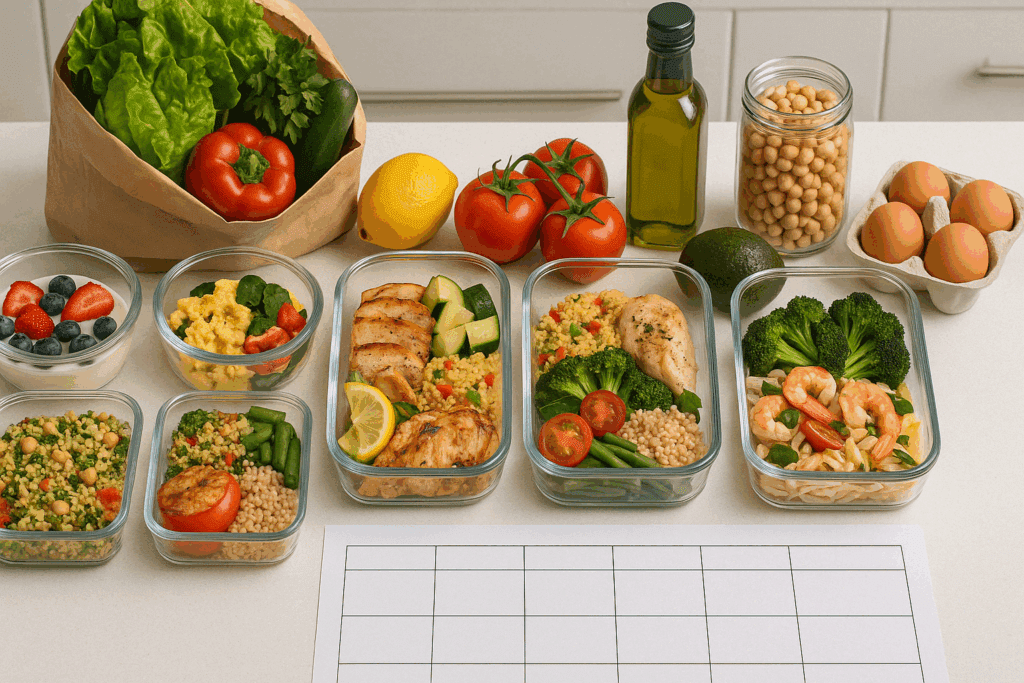
Reflecting on the Power of Healthy Mediterranean Eating
Adopting the Mediterranean diet is not just about food; it’s about embracing a lifestyle rooted in balance, flavor, and science. Healthy Mediterranean meal ideas are more than a trend—they are a time-tested, evidence-supported path to better health. Whether you’re inspired by the Mediterranean diet to lose weight, reduce disease risk, or simply feel more energized, the benefits are undeniable.
By weaving in a variety of Mediterranean diet ideas throughout your week—whether you’re packing quick Mediterranean diet lunches for work, planning nourishing Mediterranean diet dinners with family, or exploring new recipes for Mediterranean diet meals—you are making a meaningful commitment to wellness. This approach not only compares favorably to more restrictive options like ketogenic and low carb diet keto diet plans but also proves that sustainability, pleasure, and health can coexist on the same plate.
For anyone asking “Is keto a good diet?” or “Is keto no carbs the only way to manage weight?”, the Mediterranean approach offers a compelling, balanced alternative backed by years of robust clinical research. Instead of chasing quick fixes, choose the richness of Mediterranean living—where health, flavor, and vitality flourish together.
Was this article helpful? Don’t let it stop with you. Share it right now with someone who needs to see it—whether it’s a friend, a colleague, or your whole network. And if staying ahead on this topic matters to you, subscribe to this publication for the most up-to-date information. You’ll get the latest insights delivered straight to you—no searching, no missing out.
Further Reading:
7-Day Mediterranean Diet Meal Plan for Beginners, Created by a Dietitian
The Best 7-Day Mediterranean Diet Meal Plan for Beginners
Mediterranean Diet 101: A Meal Plan and Beginner’s Guide
Disclaimer
The information contained in this article is provided for general informational purposes only and is not intended to serve as medical, legal, or professional advice. While NewsHealthWatch strives to present accurate, up-to-date, and reliable content, no warranty or guarantee, expressed or implied, is made regarding the completeness, accuracy, or adequacy of the information provided. Readers are strongly advised to seek the guidance of a qualified healthcare provider or other relevant professionals before acting on any information contained in this article. NewsHealthWatch, its authors, editors, and contributors expressly disclaim any liability for any damages, losses, or consequences arising directly or indirectly from the use, interpretation, or reliance on any information presented herein. The views and opinions expressed in this article are those of the author(s) and do not necessarily reflect the official policies or positions of NewsHealthWatch.

